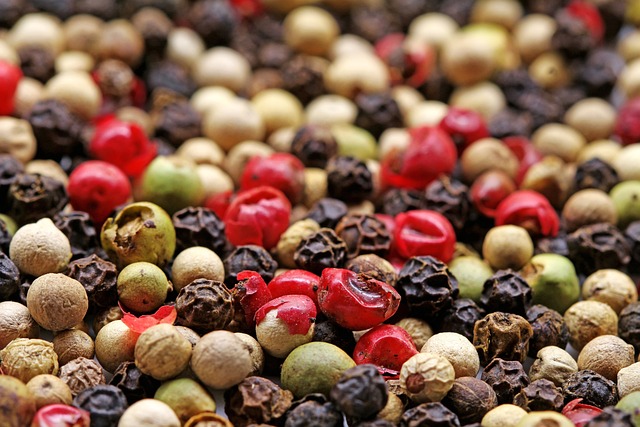Contents
The Digestive Benefits of Adding Black Pepper to Your Diet
Black pepper is not just an ordinary spice. It has numerous health benefits that make it an important ingredient in many dishes. This spice contains a compound called piperine, which is responsible for its unique flavor and aroma. More importantly, piperine also provides many digestive benefits that help to maintain digestive health.
Improved Digestion: Black pepper stimulates the secretion of digestive enzymes, which enhances the breakdown of food in the stomach. This helps to improve digestion and relieve common digestive problems such as bloating, gas, and constipation.
Enhanced Nutrient Absorption: Piperine in black pepper helps to improve the absorption of essential nutrients, such as calcium and selenium, which are essential for good health.
Reduced Inflammation: Inflammation can disrupt the digestive system and cause digestive problems. Studies have shown that piperine has anti-inflammatory properties that help to reduce inflammation in the digestive system.
Weight Loss: Black pepper can also aid in weight loss by increasing metabolism and reducing fat accumulation in the body.
In conclusion, adding black pepper to your diet not only enhances the taste of your food but also has numerous digestive benefits that contribute to overall health and wellness.
Why Black Pepper is Good for Your Digestive System
Black pepper is a popular spice used in cooking all over the world. But aside from its delicious flavor, black pepper has many health benefits, particularly for your digestive system. In fact, black pepper has been traditionally used as a digestive aid in Ayurvedic medicine.
Black Pepper Helps with Digestion
One of the benefits of black pepper is its ability to stimulate the production of digestive juices such as hydrochloric acid in your stomach. This helps break down food and makes it easier to digest. It also promotes the absorption of nutrients in your digestive tract. Additionally, black pepper has been shown to help relieve nausea and bloating.
Black Pepper May Help with Weight Loss
Black pepper contains piperine, a compound that has been shown to help with weight loss. Piperine has been found to inhibit the formation of new fat cells and reduce inflammation in the body. Furthermore, it has been shown to increase metabolism and the thermogenic activity in the body, which can help to burn more calories.
Black Pepper Has Anti-inflammatory Properties
Black pepper has been shown to have anti-inflammatory properties due to its main active ingredient, piperine. Inflammation is a common problem in the digestive system, and it can lead to conditions such as ulcerative colitis and Crohn’s disease. By reducing inflammation, black pepper can help to prevent these conditions and promote overall digestive health.
How to Incorporate Black Pepper into Your Diet
Black pepper is easy to incorporate into your diet as it can be added to almost any dish. For example, you can sprinkle it on salads, soups or stews, or use it as a seasoning for meat, fish or vegetables. You can also make use of black pepper essential oil by mixing it with a carrier oil and massaging it onto your stomach area. This can help to reduce bloating and promote digestion.
Overall, black pepper is a versatile spice with many health benefits for your digestive system. Adding black pepper to your diet is a simple and effective way to promote better digestion, reduce inflammation, and even aid in weight loss.
For more information about digestive health, check out our blog post on Digestive Health Tips.
Keywords: black pepper, digestive system, hydrochloric acid, nausea, bloating, weight loss, piperine, inflammation, ulcerative colitis, Crohn’s disease, digestion, essential oil, salads, soups, stews, meat, fish, vegetables.
The Digestive Benefits of Adding Black Pepper to Your Diet
What is Black Pepper?
Black pepper is a popular spice made from the dried fruit of the Piper nigrum plant. It is commonly used as a seasoning in many cuisines and contains several beneficial properties for the digestive system.
How does Black Pepper Benefit Digestion?
Black pepper stimulates the production of digestive enzymes in the pancreas, which helps to break down fats and proteins more efficiently. It also increases the absorption of nutrients from food, promoting better digestion and nutrient availability for the body.
Does Black Pepper Help with Gas and Bloating?
Yes, black pepper can help reduce gas and bloating by promoting the breakdown of food and preventing the formation of gas in the intestines. It also acts as a natural diuretic, which can help relieve water retention and bloating.
What is the Best Way to Add Black Pepper to Your Diet?
Black pepper is a versatile spice and can be added to many different dishes, such as soups, stews, marinades, and rubs. It is also commonly used as a table seasoning for meats, vegetables, and grains. To maximize its digestive benefits, it is best to use freshly ground black pepper.
Are there any Side Effects or Risks to Adding Black Pepper to Your Diet?
Black pepper is generally safe for most people when consumed in moderate amounts as a seasoning. However, if consumed in large amounts, it may cause digestive discomfort or irritation. It is also important to note that some medications may interact with black pepper, so it is best to consult with a healthcare provider if you have any concerns.
The Benefits of Black Pepper for Digestion
Black pepper is a popular spice used in many cultures around the world. It is often used in cooking to add flavor and heat to dishes, but it also has many health benefits, including aiding in digestion. In this article, we will explore why black pepper is beneficial for digestion and how it can help improve your overall digestive health.
How Black Pepper Helps with Digestion
One of the main reasons black pepper is beneficial for digestion is because it stimulates the production of digestive enzymes in the stomach. These enzymes help break down food more efficiently, which can lead to better absorption of nutrients and less discomfort after eating. Additionally, black pepper has been shown to increase the secretion of hydrochloric acid in the stomach, which further aids in digestion.
Other Benefits of Black Pepper
Aside from aiding in digestion, black pepper has many other health benefits. It is rich in antioxidants, which can help protect the body from damage caused by free radicals. Black pepper has also been shown to have anti-inflammatory properties, which can help alleviate symptoms of inflammatory conditions such as arthritis.
It is important to note that while black pepper can be beneficial for digestion, it should be consumed in moderation. Consuming too much black pepper can lead to stomach irritation and other gastrointestinal issues.
If you are interested in learning more about black pepper and its benefits, check out this article on black pepper from Wikipedia.
Introduction
Black pepper is not only a staple spice in every household, but it also offers numerous benefits to your digestive system.
Summary of the Digestive Benefits
- Black pepper stimulates the production of digestive enzymes.
- It aids in the breakdown of food in the stomach, making it easier to digest.
- Black pepper also helps to relieve gas, bloating and indigestion.
- It encourages the secretion of hydrochloric acid, which is necessary for proper digestion.
- Black pepper acts as a natural laxative and promotes bowel movements.
Conclusion
Overall, adding black pepper to your diet can provide significant benefits to your digestive system, helping to ensure that you get the most out of the food you eat.








































